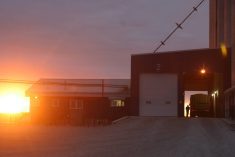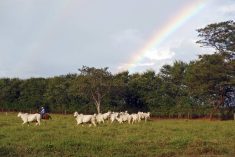MAPLE CREEK, Sask. – Angus and Ray McDougald seem to agree quite easily, from which way to take a visitor on a tour of their ranch, to the direction they are taking the ranch itself.
Maybe that’s because of the peaceful location where they live and work, just south of Maple Creek in the Cypress Hills.
The brothers were raised here, along with another who now ranches near Medicine Hat, Alta. They are the third generation on this land where on a sunny June day little disturbs the grazing cattle and swaying grass.
Read Also

Producer profits remain under significant pressure
Manitoba farmers are facing down a double hit of high input costs, like fertilizer, and low grain prices as they harvest their next crop.
They say they have always managed to reach an “easy consensus” on the major decisions. The danger is that they sometimes discuss things too much.
But they figured out what each of them does best and they do it. The result is a complementary relationship that benefits the ranch.
“You can’t both be managing all the time,” Angus points out.
McDougald Ranch is home to 430 pairs, 430 yearlings and 25 bulls. About three-quarters of the ranch is crown lease. The ranch totals about 13,000 acres and most of it is native grass.
And that’s where they agree again.
“Grass is our No. 1 priority,” said Ray.
Range management has been a focus for the family since the 1950s when range scientist Bob Lodge first did an analysis on the ranch. Since then the McDougalds have concentrated on maintaining healthy pastures that allow them to graze year round.
About 14 years ago they switched to June calving, months later than most of the other ranches in the area.
“With June calving you have just a healthier herd,” said Ray.
Weather isn’t as much of a factor and neither is shelter.
Branding takes place in late September or October and the calves stay with their mothers through the winter until April. Pellets or hay supplement winter grazing.
“They won’t see a corral again (after branding) until next March or April,” Ray explained. “We’ve reduced how much we handle our cattle. It’s a low labour, low input management style.”
It has resulted in less stress on all involved.
For the last 15 years they’ve sold their long yearlings by sending out bid sheets to order buyers and feedlots.
Because the cattle graze year round the McDougalds can keep their herd a little smaller and manage the grass better, especially during drought. Tame grass is grazed first and the cattle move to native pasture in mid-July. Native grass is grazed once each year.
Most years grass seed is harvested by machine. That enterprise began in 1994 and species include porcupine grass and needle and thread.
The McDougalds act as wholesalers and most of their seed is purchased for reclamation projects. They save the “junk” for their own reclamation areas to return exactly the same mix as was removed.
This year seed production was almost non-existent so the harvesters didn’t turn a wheel.
Normally, the time they spend harvesting grass seed is when others are putting up hay. The McDougalds purchase the little bit of hay they do use.
Ray’s wife Noelene has about 50 wool sheep that also use the grass.
There are four irrigation reservoirs available, along with a well, natural springs and five kilometres of water pipeline. The Maple Creek runs through the ranch and provides water during winter and spring.
The brothers do most of the ranch work themselves. Ray is responsible for the paperwork and looks after the grass seed business. Angus tends toward the “wrench pulling and machine fixing.”
Angus’s wife, Darlene, works off the ranch. He has two adult daughters, Angela and Alexandra, and a son, Jim, entering Grade 12.
Ray and Noelene’s son, Shaun, is 12.
The brothers aren’t sure whether one or more of the children will take over the ranch. Angus said it’s hard to know what it would take to make the business profitable enough to support more families.
However, they do know that through their innovative ideas – something they say they learned from their father, Jack – they have kept the land healthy.
They were recently honoured for their efforts with an environmental stewardship award from the Saskatchewan Stock Growers Association, Royal Bank and Ducks Unlimited Canada. A national winner will be announced at the Canadian Cattlemen’s Association convention in Niagara Falls this month.
They aren’t afraid of progress and what needs to be done to make things work. That’s why they sought out development of a gravel operation, followed by reclamation of course, on their deeded land. And it’s why natural gas exploration on some of their leased land doesn’t worry them too much.
“It’s going to happen,” said Ray.
“It’s going to change life when it gets here,” added Angus.

















